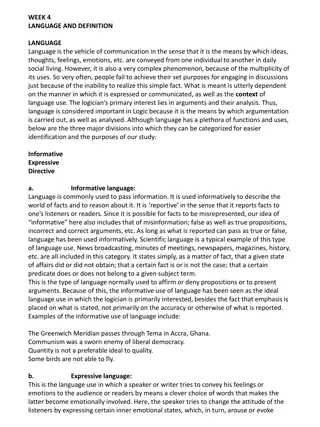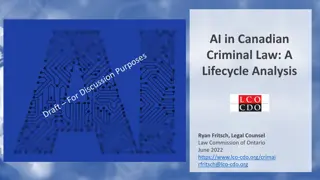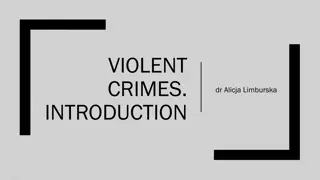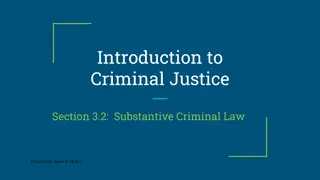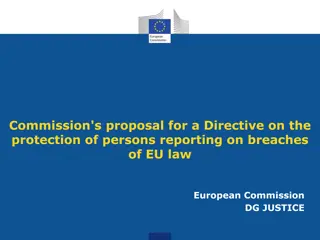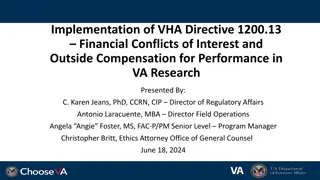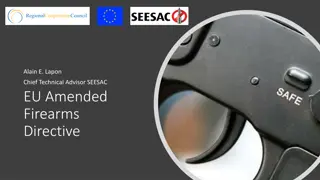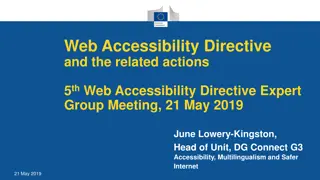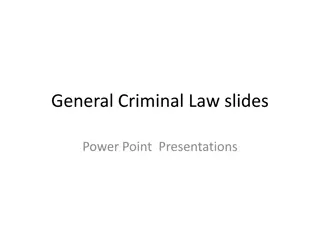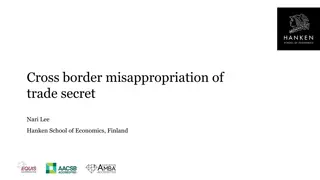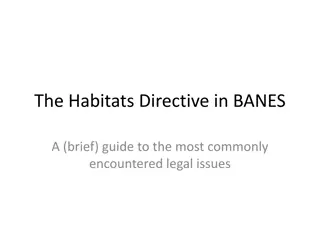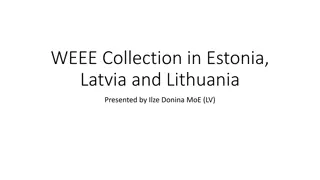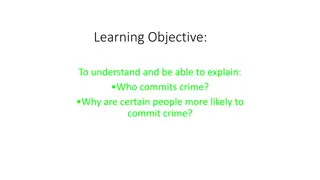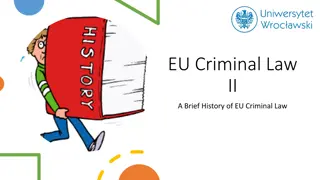Understanding EU Criminal Law and Directive 2013/48
Explore the rights of the accused under EU Criminal Law, focusing on minimum standards, the introduction of Directive 2013/48, its scope, and the right to access a lawyer. The Directive aims to strengthen defense rights and ensure a fair trial, highlighting the need for legal aid, interpreters, and the right to examine witnesses. Exceptions to the right to access a lawyer are also outlined.
Download Presentation

Please find below an Image/Link to download the presentation.
The content on the website is provided AS IS for your information and personal use only. It may not be sold, licensed, or shared on other websites without obtaining consent from the author. Download presentation by click this link. If you encounter any issues during the download, it is possible that the publisher has removed the file from their server.
E N D
Presentation Transcript
EU Criminal Law Lecture VII Rights of the accused
Minimum standard - ECHR information Time to prepare defence Interpretor Right to examin/call witness/evidence Legal aid
Why the Directive 2013/48 was introduced? Main aim: the EU legislator wanted to further strenghen the rights of the defence. Directive must be seen as a part of a package of defence rights (see: six directives) and in the context of the right to a fairl trial (see: article 6 ECHR, article 47 and 48 CFR EU). The Hague and Stockholm Programmes see and read if you want. One of the aims was also to strengthen the principle of mutual recognition of judgments and mutual trust. The idea that membership of the Council of Europe and ratification of the ECHR is sufficient to ensure the right to a fair trial has proved wrong.
The scope of the directive The Directives is applicable in all criminal proceedings, as well as to the EAW proceedings. Recital 13: Without prejudice to the obligations of Member States under the ECHR to ensure the right to a fair trial, proceedings in relation to minor offending which take place within a prison and proceedings in relation to offences committed in a military context which are dealt with by a commanding officer should not be considered to be criminal proceedings for the purposes of this Directive.
Right to access to a laywer article 3.2 Suspects or accused persons shall have access to a lawyer without undue delay. In any event, suspects or accused persons shall have access to a lawyer from whichever of the following points in time is the earliest: (a) before they are questioned by the police or by another law enforcement or judicial authority; (b) upon the carrying out by investigating or other competent authorities of an investigative or other evidence-gathering act in accordance with point (c) of paragraph 3; (c) without undue delay after deprivation of liberty; (d) where they have been summoned to appear before a court having jurisdiction in criminal matters, in due time before they appear before that court.
Exceptions article 3 5. derogate from the application of point (c) of paragraph 2 where the geographical remoteness of a suspect or accused person makes it impossible to ensure the right of access to a lawyer without undue delay after deprivation of liberty. In exceptional circumstances and only at the pre-trial stage, Member States may temporarily 6. In exceptional circumstances and only at the pre-trial stage, Member States may temporarily derogate from the application of the rights provided for in paragraph 3 to the extent justified in the light of the particular circumstances of the case, on the basis of one of the following compelling reasons: (a) where there is an urgent need to avert serious adverse consequences for the life, liberty or physical integrity of a person; (b) where immediate action by the investigating authorities is imperative to prevent substantial jeopardy to criminal proceedings.
What does the access to a lawyer mean? Lawyer/defence lawyer has a right to active participation during procedural activity (interrogation/identity parade etc.) Not enughnot sufficient - ensuring the presence of a defence lawyer who can only observe the course of the proceedings without being able to influence them
States obligations Member States (national authorities) are obliged to make information on the possibility of lawyers' assistance available. For example, lists of lawyers providing legal assistance or lists of lawyers duty in a given day. The suspect/suspected person must also be informed of the right to a lawyer/the right to access a lawyer.
General conditions for applying temporary derogations article 8 1. Any temporary derogation under Article 3(5) or (6) or under Article 5(3) shall (a) be proportionate and not go beyond what is necessary; (b) be strictly limited in time; (c) not be based exclusively on the type or the seriousness of the alleged offence; and (d) not prejudice the overall fairness of the proceedings. 2. Temporary derogations under Article 3(5) or (6) may be authorised only by a duly reasoned decision taken on a case-by-case basis, either by a judicial authority, or by another competent authority on condition that the decision can be submitted to judicial review. The duly reasoned decision shall be recorded using the recording procedure in accordance with the law of the Member State concerned. 3. Temporary derogations under Article 5(3) may be authorised only on a case-by-case basis, either by a judicial authority, or by another competent authority on condition that the decision can be submitted to judicial review.
Vaiwier of the right to access to a lawyer article 9 1. Member States shall ensure that, in relation to any waiver of a right referred to in Articles 3 and 10: (a) the suspect or accused person has been provided, orally or in writing, with clear and sufficient information in simple and understandable language about the content of the right concerned and the possible consequences of waiving it; and (b) the waiver is given voluntarily and unequivocally. Without prejudice to national law requiring the mandatory presence or assistance of a lawyer, 2. under which the waiver was given, using the recording procedure in accordance with the law of the Member State concerned. The waiver, which can be made in writing or orally, shall be noted, as well as the circumstances 3. Member States shall ensure that suspects or accused persons may revoke a waiver subsequently at any point during the criminal proceedings and that they are informed about that possibility. Such a revocation shall have effect from the moment it is made.
Article 12 Remedies Remedies 1. criminal proceedings, as well as requested persons in European arrest warrant proceedings, have an effective remedy under national law in the event of a breach of the rights under this Directive. 2. Without prejudice to national rules and systems on the admissibility of evidence, Member States shall ensure that, in criminal proceedings, in the assessment of statements made by suspects or accused persons or of evidence obtained in breach of their right to a lawyer or in cases where a derogation to this right was authorised in accordance with Article 3(6), the rights of the defence and the fairness of the proceedings are respected. Member States shall ensure that suspects or accused persons in
Recital 50 Member States should ensure that in the assessment of statements made by suspects or accused persons or of evidence obtained in breach of their right to a lawyer, or in cases where a derogation from that right was authorised in accordance with this Directive, the rights of the defence and the fairness of the proceedings are respected. In this context, regard should be had to the case-law of the European Court of Human Rights, which has established that the rights of the defence will, in principle, be irretrievably prejudiced when incriminating statements made during police interrogation without access to a lawyer are used for a conviction. This should be without prejudice to the use of statements for other purposes permitted under national law, such as the need to execute urgent investigative acts to avoid the perpetration of other offences or serious adverse consequences for any person or related to an urgent need to prevent substantial jeopardy to criminal proceedings where access to a lawyer or delaying the investigation would irretrievably prejudice the ongoing investigations regarding a serious crime. Further, this should be without prejudice to national rules or systems regarding admissibility of evidence, and should not prevent Member States from maintaining a system whereby all existing evidence can be adduced before a court or a judge, without there being any separate or prior assessment as to admissibility of such evidence.
(53) Member States should ensure that the provisions of this correspond to rights guaranteed by the ECHR, are implemented consistently with those of the ECHR and as developed by case-law of the European Court of Human Rights. Directive, where they See also recital 53:
In reality Remedies are ineffective. There was a provision in draft Directive 2013/48 that introduced an evidentiary ban on the use of self- incriminating statements of the accused made in the absence of defence lawyer. Now the EU law refers to national regulations and the ECtHR case law. Depending on the system and procedural rules of a particular state, evidence that was obtained in the absence of a lawyer can be the basis for a guilty verdict.
Free choice of defence councel Accused persons/suspects/suspected persons are entitled to a lawyer of their own choice to represent them. Council Directive 77/249/EEC of 22 March 1977 to facilitate the effective exercise by lawyers of freedom to provide services. Article 4 1. Activities relating to the representation of a client in legal proceedings or before public authorities shall be pursued in each host Member State under the conditions laid down for lawyers established in that State, with the exception of any conditions requiring residence, or registration with a professional organization, in that State. Directive 98/5/EC of the European Parliament and of the Council of 16 February 1998 to facilitate practice of the profession of lawyer on a permanent basis in a Member State other than that in which the qualification was obtained
Ex officio legal assistance Artcile 47 of the EU Charter of Fundamental Rights Legal aid shall be made available to those who lack sufficient resources in so far as such aid is necessary to ensure effective access to justice. Article 6.3(c) of the European Convention Everyone charged with a criminal offence has the following minimum rights ( ) to defend himself in person or through legal assistance of his own choosing or, if he has not sufficient means to pay for legal assistance, to be given it free when the interests of justice so require;
Ex officio legal assistance Reasons for appointing a lawyer ex officio: - effective access to justice requires it - the interests of justice require that a person be granted a legal aid lawyer ex officio (e.g. due to age, state of health of the person, ability to understand the proceedings) - the person cannot afford to pay the costs of the defence
What is ex officio legal assistance/legal aid? Article 3 Definition For the purposes of this Directive, legal aid means funding by a Member State of the assistance of a lawyer, enabling the exercise of the right of access to a lawyer. Directive 2016/1919
Directive 2016/1919 Article 4 Legal aid in criminal proceedings 1. Member States shall ensure that suspects and accused persons who lack sufficient resources to pay for the assistance of a lawyer have the right to legal aid when the interests of justice so require. 2. Member States may apply a means test, a merits test, or both to determine whether legal aid is to be granted in accordance with paragraph 1. 3. Where a Member State applies a means test, it shall take into account all relevant and objective factors, such as the income, capital and family situation of the person concerned, as well as the costs of the assistance of a lawyer and the standard of living in that Member State, in order to determine whether, in accordance with the applicable criteria in that Member State, a suspect or an accused person lacks sufficient resources to pay for the assistance of a lawyer. 4. Where a Member State applies a merits test, it shall take into account the seriousness of the criminal offence, the complexity of the case and the severity of the sanction at stake, in order to determine whether the interests of justice require legal aid to be granted. In any event, the merits test shall be deemed to have been met in the following situations: (a) where a suspect or an accused person is brought before a competent court or judge in order to decide on detention at any stage of the proceedings within the scope of this Directive; and (b) during detention. 5. Member States shall ensure that legal aid is granted without undue delay, and at the latest before questioning by the police, by another law enforcement authority or by a judicial authority, or before the investigative or evidence-gathering acts referred to in point (c) of Article 2(1) are carried out. 6. Legal aid shall be granted only for the purposes of the criminal proceedings in which the person concerned is suspected or accused of having committed a criminal offence.
The EU Member States may adopt: - an assessment of the affordability of the costs of a defence of his/her choice; - an assessment of the seriousness of the offence or apply these criteria together. Ex officio legal assistance That means: - legal aid is granted ex officio if the accused cannot afford legal aid of his/her own choice. - OR legal aid is granted ex officio if the accused is charged with a serious offence or is detained in custody. - OR legal aid is available if he/she has committed a serious crime and cannot afford the costs of defending himself/herself.
Article 6 Decisions regarding the granting of legal aid 1. Decisions on whether or not to grant legal aid and on the assignment of lawyers shall be made, without undue delay, by a competent authority. Member States shall take appropriate measures to ensure that the competent authority takes its decisions diligently, respecting the rights of the defence. Directive 2016/1919 2. ensure that suspects, accused persons and requested persons are informed in writing if their request for legal aid is refused in full or in part. Member States shall take necessary measures to Article 9 Vulnerable persons Member States shall ensure that the particular needs of vulnerable suspects, requested persons are taken into account in the implementation of this Directive. accused persons and
Lawyer client-privilege Article 4 of the directive 2013/48 Confidentiality Member States shall respect the confidentiality of communication between suspects or accused persons and their lawyer in the exercise of the right of access to a lawyer provided for under this Directive. Such communication shall include telephone conversations and other permitted under national law. meetings, forms correspondence, communication of
Court of First Instance, T-125/03 17 September 2007 First, that protection seeks to safeguard the public interest in the proper administration of justice in ensuring that a client is free to consult his lawyer without fear that any confidences which he imparts may subsequently be disclosed. Secondly, its purpose is to avoid the harm which may be caused to the undertaking s rights of the defence as a result of the Commission reading the contents of a confidential document and improperly adding it to the investigation file. Therefore, even if that document is not used as evidence in a decision imposing a penalty under the competition rules, the undertaking may suffer harm which cannot be made good or can only be made good with great difficulty. Information covered by LPP might be used by the Commission, directly or indirectly, in order to obtain new information or new evidence without the undertaking in question always being able to identify or prevent such information or evidence from being used against it. Moreover, harm which the undertaking concerned would suffer as a result of disclosure to third parties of information covered by LPP could not be made good, for example if that information were used in a statement of objections in the course of the Commission s administrative procedure. The mere fact that the Commission cannot use privileged documents as evidence in a decision imposing a penalty is thus not sufficient to make good or eliminate the harm which resulted from the Commission s reading the content of the documents .
Exceptions lawyer-client privilege Recital 33: Confidentiality of communication between suspects or accused persons and their lawyer is key to ensuring the effective exercise of the rights of the defence and is an essential part of the right to a fair trial. Member States should therefore respect the confidentiality of meetings and other forms of communication between the lawyer and the suspect or accused person in the exercise of the right of access to a lawyer provided for in this Directive, without derogation. ( ) The obligation to respect confidentiality not only implies that Member States should refrain from interfering with or accessing such communication but also that, where suspects or accused persons are deprived of liberty or otherwise find themselves in a place under the control of the State, Member States should ensure that arrangements for communication uphold and protect confidentiality. This is without prejudice to any mechanisms that are in place in detention facilities with the purpose of avoiding illicit enclosures being sent to detainees, such as screening correspondence, provided that such mechanisms do not allow the competent authorities to read the communication between suspects or accused persons and their lawyer. BUT
Exceptions lawyer-client privilege Recital 33 This Directive is without prejudice to procedures that address the situation where there are objective and factual circumstances giving rise to the suspicion that the lawyer is involved with the suspect or accused person in a criminal offence. Any criminal activity on the part of a lawyer should not be considered to be legitimate assistance to suspects or accused persons within the framework of this Directive.
Exceptions lawyer-client privilege Lawyer client privilege does not exempt defence councel from reporting their suspicions concernig possible unlawful activities (money loundering) of their clients. See: Directive (EU) 2015/849 of the European Parliament and of the Council of 20 May 2015 on the prevention of the use of the financial system for the purposes of money laundering or terrorist financing, amending Regulation (EU) No 648/2012 of the European Parliament and of the Council, and repealing Directive 2005/60/EC of the European Parliament and of the Council and Commission Directive 2006/70/EC
Exceptions lawyer-client privilege Recital 9 to the directive 2015/849: Legal professionals, as defined by the Member States, should be subject to this Directive when participating in financial or corporate transactions, including when providing tax advice, where there is the greatest risk of the services of those legal professionals being misused for the purpose of laundering the proceeds of criminal activity or for the purpose of terrorist financing. There should, however, be exemptions from any obligation to report information obtained before, during or after judicial proceedings, or in the course of ascertaining the legal position of a client. Therefore, legal advice should remain subject to the obligation of professional secrecy, except where the legal professional is taking part in money laundering or terrorist financing, the legal advice is provided for the purposes of money laundering or terrorist financing, or the legal professional knows that the client is seeking legal advice for the purposes of money laundering or terrorist financing.
Exceptions lawyer-client privilege Article 34 1. By way of derogation from Article 33(1), Member States may, in the case of obliged entities referred to in point (3)(a), (b) and (d) of Article 2(1), designate an appropriate self-regulatory body of the profession concerned as the authority to receive the information referred to in Article 33(1). Without prejudice to paragraph 2, the designated self-regulatory body shall, in cases referred to in the first subparagraph of this paragraph, forward the information to the FIU promptly and unfiltered. 2. independent legal professionals, auditors, external accountants and tax advisors only to the strict extent that such exemption relates to information that they receive from, or obtain on, one of their clients, in the course of ascertaining the legal position of their client, or performing their task of defending or representing that client in, or concerning, judicial proceedings, including providing advice on instituting or avoiding such proceedings, whether such information is received or obtained before, during or after such proceedings. Member States shall not apply the obligations laid down in Article 33(1) to notaries, other
The right to inform others of arrest Article 5 1. Member States shall ensure that suspects or accused persons who are deprived of liberty have the right to have at least one person, such as a relative or an employer, nominated by them, informed of their deprivation of liberty without undue delay if they so wish. 2. If the suspect or accused person is a child, Member States shall ensure that the holder of parental responsibility of the child is informed as soon as possible of the deprivation of liberty and of the reasons pertaining thereto, unless it would be contrary to the best interests of the child, in which case another appropriate adult shall be informed. For the purposes of this paragraph, a person below the age of 18 years shall be considered to be a child. 3. Member States may temporarily derogate from the application of the rights set out in paragraphs 1 and 2 where justified in the light of the particular circumstances of the case on the basis of one of the following compelling reasons: (a) where there is an urgent need to avert serious adverse consequences for the life, liberty or physical integrity of a person; (b)where there is an urgent need to prevent a situation where criminal proceedings could be substantially jeopardised. 4. Where Member States temporarily derogate from the application of the right set out in paragraph 2, they shall ensure that an authority responsible for the protection or welfare of children is informed without undue delay of the deprivation of liberty of the child.







